Collagen is the biggest trend in supplements I’ve seen, second to only CBD. It’s everywhere, with some internet doctors building their empire on collagen products alone.
Whenever I first mention collagen to someone who isn’t familiar, I actually get confusion. They instantly think I’m talking about plastic surgery. Wouldn’t it be nice if a collagen supplement had this improvement? For example, I started taking collagen and this happened:
BEFORE:
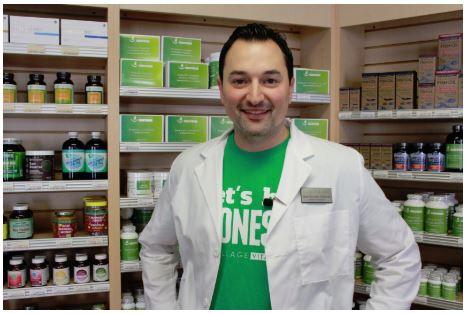
AFTER:

Yeah right.
Besides being silly, this example demonstrates how collagen is actually used. We are going to focus on the dietary intake of collagen and also supplementation, but collagen can be used medically or cosmetically as well.
In this article, we’ll explain what collagen is, how it works with your body, and what the best supplements are.
What Is Collagen?
Collagen is a protein.
The end.
Imagine if I did that? It would be the shortest answer I’ve literally ever given to anything ever. Anyway, back to it.
Collagen isn’t just any protein like the ones we discussed previously. Collagen is a protein composed of amino acids in a very unique sequence that gives it a very different shape than other proteins we talk about.
Many proteins, especially dietary proteins, are globular or round. Collagen forms into a helix or spiral, making it long and thin. Here’s my artist rendering:
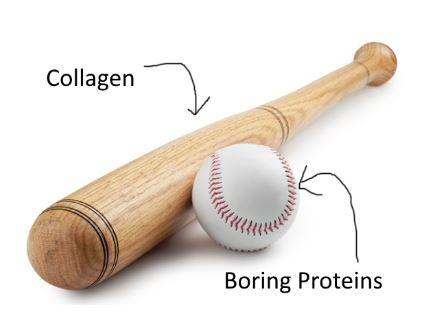
The cool thing about this unique structure is that you can take a collagen strand and pack it in really tight with other collagen strands, called collagen fibers. This makes it dense and strong. I’m feeling very visual today, so here’s the comparison:
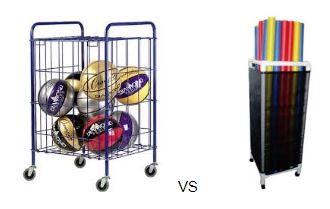
Collagen’s shape and ability to tightly pack into collagen fibers means it is PERFECT as structural support. Collagen makes up almost the entirety of all our support structures in the body. From giving organs their structure to keeping blood vessels round, even to that beautiful coif of hair of yours (mine’s receding…). It’s found in your muscles, tendons, ligaments. Your nails are almost all collagen. Collagen makes your skin strong and elastic until aging gives you that roundhouse kick to the gut and wrinkles start. If collagen fibers interact with minerals like calcium, the structures get even stronger and make bone. Collagen is literally everywhere and is very important to our bodies.
Here’s a cool picture I found that shows the progression from amino acid chains to collagen fibers:
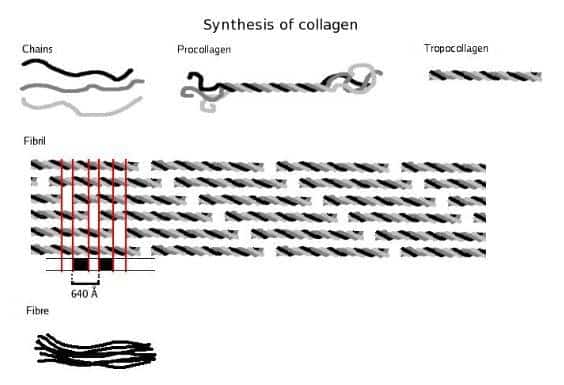
If you notice the fibrils are kind of staggered from each other. That’s actually naturally occurring, which is a marvel in and of itself. Even cooler, those gaps are where other stuff interacts to determine the type of thing the fibrils make. For example, calcium hydroxyapatite (our favorite form of calcium) goes to work in those gaps to make bone.
We Don’t Get Enough Collagen In Our Diet
Raise your hand if you are eating lots of organs, hooves, cowhide, or animal ligaments!
Modern diets have little if any collagen-rich foods.
Way back when, in an era where we had more time for bonding, thought, and cooking, homemade broths were common. Making a great broth consisted of taking whole chickens or turkeys, placing them in a pot with water, vegetables, and other nutrient-dense foods and cooking the mixture slowly over time, usually multiple hours or even days. The hot water and soaking allowed for the extraction of some healthy compounds found in bones, such as collagen and gelatins. The slow cooking of the protein sources made them more easily digestible. The compounds in a broth were often a good choice for people who were sick or had gut irritation, as homemade broths had compounds that were gentle and helped reduce local inflammation. The salt, potassium, and other minerals, as well as the fluid, helps rehydrate and rebalance electrolytes. Homemade, real broth was something wonderful.
This is why a well-made collagen is such an important supplement. Collagen-rich foods are scarce. Collagen is healthy: it’s rich in protein, has a unique combination of amino acids, and is so vital to almost all of our body systems.
Type I vs Type II Collagen
There are different types of collagen. Without getting too geeky, it comes down to what the collagen interacts with and how it is formed that determines the type. There have been 28 different types identified to date, but many of you have probably only heard of two: Type I and Type II collagen.
Type I Collagen is found in skin, tendons, blood vessels, organs, and bone.
Type II Collagen is mostly found in cartilage.
The theory is that if you have joint pain, Type II collagen is better than Type I. If you want healthier skin, gut health, etc, then Type I is better.
Without getting too far ahead, I don’t think there is really any clinical difference between Type I and Type II collagen. As in, if you take a collagen powder that’s predominantly Type I, you’ll get plenty of benefit for joint health without having to specifically search for Type II collagen products. If you are taking joint health formulations that contain Type II collagen, those doses are typically much lower and may or may not have a benefit on skin, hair, or nail health. I’ve been on the prowl for any data that compares both of them for treatment of joint pain, and I’ll update this article if I find it.
Collagen supplements will be predominantly Type I. My recommendation (spoiler alert) is to use a collagen powder regularly, which is mostly Type I, to reap all of the benefits of collagen.
Making Collagen Supplements
The process of making collagen supplements is a little bit gross, because it has to do with animal parts. To get collagen supplements, we have to take collagen-rich tissues from animals and treat them in a way to separate the collagen fibers from the rest of the stuff (i.e. water and fat). The most common source for collagen supplements is cowhide. We can also use chicken sternums (a source rich in more Type II collagen) or fish bones, scales, and skin.
Once the collagen has been separated from its source, it is hydrolyzed, or reacted with water. What we’re left with is small bits of collagen called collagen peptides. These collagen peptides go by another name: collagen hydrolysate. These bits are readily absorbable from the GI tract and are utilized directly in the creation of collagen throughout the body.
When we say collagen in the supplement world, we mean any and all of these things as they are the same:
- Collagen
- Collagen hydrolysate
- Collagen peptides
It should be noted that regardless of source, collagen has almost identical composition. I’ve attached a table from wiki that shows this:
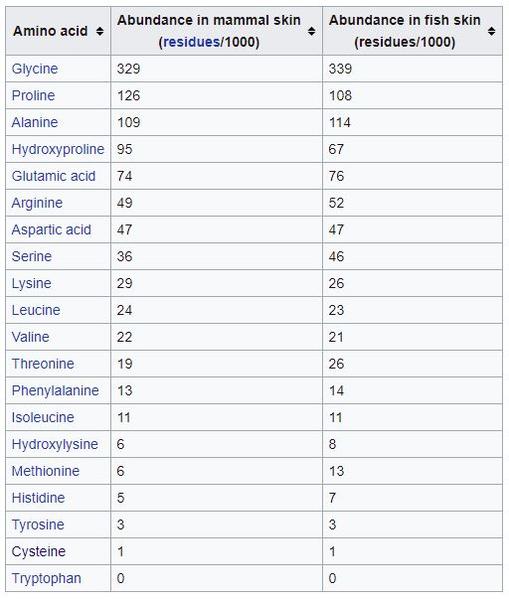
Part of my love of science and health comes from how awe-inspiring it is. It’s amazing to me how complicated stuff like this is, yet there are patterns and consistency across various parts of nature!
What’s Better – Fish, Beef, or Chicken Collagen?
Some marketers in this lovely natural products industry like to promote one form over another, but do so with little clinical evidence. This “expert” or that will say their fish collagen is superior because of the smaller atomic weight, meaning they are more absorbable. Or my chickens are cleaner than your cows… whatever the argument is.
What’s real? Collagen is collagen in the supplement world, no matter the source. We know that collagen hydrolysate (collagen that’s been turned into its smaller bits for supplementation) is absorbed extensively – almost 90-95%, regardless of the source.
But, there are some financial differences. It comes down to how much collagen you get for your dollar. In general, beef collagen offer a higher yield for a lower cost than other collagen sources.
Bone broth powder is a popular supplement that contains collagen as well as a lot of other stuff, and as a result, bone broth powders tend to be a bit more expensive when comparing the cost per gram of collagen.
My recommendation: beef collagen for the win-win. Low cost per gram collagen, lots of collagen and protein per serving, with all of the health benefits.
Collagen vs Gelatin
If you’ve done any research around collagen, gelatin is almost always discussed as well. What’s gelatin and how is it different?
In the spirit of brevity, gelatin is simply collagen that’s been processed some more. Think of it like cooked a collagen supplement. Gelatin is collagen peptides that have been further processed, usually by more hydrolysation. As a result, gelatin interacts differently with moisture. A well made collagen supplement will dissolve readily in water. Gelatin will, well, gel in water.
Otherwise, everything else is exactly the same between collagen and gelatin. They have the same amino acid content and the same nutritional benefit. Gelatin does take a bit longer to digest and can help with the GI lining even more so than collagen. If you have a condition that requires your gut to heal, gelatin is the way to fly.
Here’s an overview of the process of creating collagen and gelatin:

Collagen vs Bone Broth
Another wingman to the collagen crew is bone broth. We’ve written about bone broth and the numerous health benefits to including a well made (preferably homemade) bone broth to your diet on the regular.
Bone broth is a mixture of animal bones, vegetables, spices and salt to water. It sits for an extended time – about a day or two. The longer the better.
Exposing bones to water over a period of time sounds a lot like how we make collagen and gelatin, right? This old-fashioned process of cooking bones and vegetables resulted in crucial nutrients, specifically collagen and gelatin, to accumulate in the water. This, along with all the goodies from the vegetables leaching into the water makes a very nutritious, protein-rich meal.
Collagen and gelatin are *in* bone broth. Bone broth can be a source of collagen. Bone broth supplements will be rich in collagen, gelatin, and other nutrients. But collagen doesn’t have to come from bone broth.
Because it has the other “stuff”, bone broth won’t have as high of a concentration of collagen or protein as a collagen only supplement has, and is usually more expensive per serving.
Lo’ Collagen Mo’ Problems
Most of us won’t ever have a true medical problem where we don’t have enough or make enough collagen. There are a few diseases or conditions that harm our natural collagen production. We mention these for completeness sake. If someone experiencing these problems took collagen supplements, there may be some improvement in symptoms, but there will be no resolution.
Vitamin C Deficiency
I’m talking the real Vitamin C deficiency – scurvy. Check out our past rant on why I make that distinction. Vitamin C is a building block that leads to collagen production, making your collagen practically defective. This prevents the formation of strong connective tissue. Gums can bleed, hair gets weak, and blood can actually leak from the skin without cuts or scratches.
Autoimmune Disease
Autoimmune disease such as rheumatoid arthritis or lupus have been known to attack collagen fibers, weakening their structural integrity..
Infections
Bacteria or viruses can secrete an enzyme, collagenase, which breaks down collagen. This is bad for the human.
It should be noted that collagen supplementation, if you have an autoimmune disease or are currently sick, may be wise to counteract these effects. Maybe this is one of the reasons why chicken soup is so good for the soul…
Do I Need Collagen Supplements, Though?
Collagen deficiency isn’t really a problem for most of us. Our bodies make plenty of collagen – even with bad diets. It’s not like people who eat at only McDonald’s are puddles of flesh on the ground. They have bones, open blood vessels, and a general, upright, human structure.
We’ve now noted that we don’t have collagen-rich foods much anymore. You don’t need collagen supplements if you commit to eating more collagen rich foods on a regular basis. Organ meats and bone broth are ways to get more collagen.
If you’re like me, you’re disgusted by the thought of eating liver, etc. A collagen supplement is great, and yes, I recommend it completely. But, there are some key factors about collagen you have to understand before you accept it into your heart.
Collagen is NOT a Complete Protein
First, collagen isn’t the *best* protein. An important distinction between collagen and other proteins is regarding amino acid content. Collagen, as this section heading ominously foretold, is NOT a complete protein. This means it does not supply all 9 essential amino acids, which are the amino acids our body can’t make and must get from the diet. Instead, collagen is lacking tryptophan. It is low in other non-essential amino acids: isoleucine, threonine, methionine.
My argument is that the amino acid mix of collagen being unique is an advantage, not a liability.
Collagen isn’t a complete protein, and therefore shouldn’t be used as a sole source of protein in your diet. It is GREAT as an additional protein source because it is so dense in protein; small amounts of collagen supplements will yield LOTS of protein. A 20g scoop of beef collagen will yield 18g of protein.
We aren’t taking collagen solely for the protein benefit. The real benefit isn’t in how many grams of protein collagen has. It’s in its unique amino acid mix and resulting unique structure.
While it lacks tryptophan and has an unusual amino acid blend, it is rich in glycine, proline, hydroxyproline, and arginine. Glycine is a precursor to glutathione, which is a powerful antioxidant and is found in the liver and helps with metabolism. Glycine and arginine are precursors for creatine, important for muscle stamina.
And those collagen molecules are taken up readily by our GI tract and used to make further collagen in our body. Collagen peptides will aggregate and stimulate the production of more collagen, which has a positive impact on many other systems.
What Is Collagen Used For?
What systems can collagen help? Glad you asked! Dietary collagen has been shown to support the following systems:
- Hair, skin, and nails
- Joints, ligaments, and tendons
- The GI tract, especially the lining
We eat collagen-rich foods or take a well made collagen supplement. The collagen is absorbed completely. The collagen is then directly utilized by the body to make collagen fibers in all the important places.
When taken up by the cells of the GI tract, they are used directly by the cells lining the gut (the ones first absorbing them). They get first dibs. As a result, regular collagen intake has been shown to support a healthy gut lining and strengthen the GI tract. This was the game-changer for me. Reading the research that shows collagen (and gelatin) are utilized by the GI tract first – strengthening the GI lining, promoting tissue repair, and build a healthy gut wall – makes collagen a no-brainer for a recommendation and moved it to the top of the pile on the Vital 5 recommendation list.
The GI protective benefit is an important step in the REAL boosting of the immune system. For people who feel they have “leaky gut”, a healthy daily dose of collagen could help support their digestion.
Dietary collagen has been shown to accumulate in joints, tendons, and ligaments. As a result, people who use dietary collagen will notice a reduction in joint pain and arthritis symptoms. This has been supported by actual good research, and in particular in a study with athletes, whose joints are abused far worse than most of us.
Collagen, as we have mentioned, is a building block to healthy hair, skin, and nails. Using regular dietary collagen can improve hair, skin, and nail health. I’ve heard positive feedback that collagen supplements have a profound impact on hair and nails of many of our customers who have tried it, and it is a top recommendation for me.
There Is No Animal-Free Collagen
Unfortunately for our vegan and some of our vegetarian friends, collagen is an animal product. There is no vegan source of collagen.
To make vegans feel better, many blogs will recommend increasing nutrients that increase collagen production or help collagen work better. They’re writing as if this will be the same as taking collagen directly. I want our vegan friends to feel great, but we have to keep it real with them. While it is a solid strategy in general, it will not be the same as increasing dietary collagen.
Yes, it’s good to eat those foods. No, your body won’t naturally increase collagen production just because you eat those foods. As we’ve stated before, your collagen production decreases after age 25 and jumps off a cliff after menopause (for women, of course – men are fine after menopause). No diet rich in pineapples will help, nor will a glorified multivitamin from the Garden of Lies.
I have a different way to help our plant-eating friends. Instead of worrying about micronutrients, focus on getting the recommended daily allowance of protein. Reaching the goal of about 1 gram of protein for every kilogram of body weight (your weight in pounds divided by 2.2) is difficult when eating a plant-based diet, but not impossible. Having amino acids readily available in the blood and eating a varied diet will certainly not hurt to improve your collagen production.
Supplement Quality Issues
Collagen quality issues are similar to those we covered around protein. Because collagen is an animal product, we have to be concerned about the quality of the animal’s food and what the animal was exposed to. Because we take it a step further here at Woodstock Vitamins- we have ethical standards around the raising of animals that must be met before we approve a supplement sourced from animals.
If all is well on that front, then we must be concerned with how the materials are processed. Over-processed collagen will degrade the proteins and denature it, resulting in an unabsorbable or not utilizable protein.
We want our collagen supplement raw material to be:
- Pasture-raised, not factory farm cattle
- Grass-fed, not GMO feed or feed with inflammatory ingredients like gluten, dairy, soy, corn, grains, or legumes
- Antibiotic-free
- Hormone-free (some cows are treated with growth hormone to bulk them up)
- Mad cow disease-free (It seems silly, but this should be a high concern!)
- Sustainably fished! Fish should be wild-caught, with no bottom trawling, among other things.
- Minimally processed
- Odorless, tasteless, and colorless to a light brown
A Hidden Source of Collagen
Say you’re an avid reader of our weekly, ranty blogs. Let’s also say you’ve studied the Vital 5 and are using our unique formula Calcium Care because you want to support your bones with one of the best calcium formulas on the market (I did not dislocate my elbow patting myself on the back).
Well, there’s one more advantage to Calcium Care – it is rich in an awesome source of Type II collagen. Boom. Mind blown, right?
Collagen For (Almost) Everyone
Collagen supplementation, when done correctly, is a great idea for most people.
Our Vital 5 are what we consider the 5 most important supplements someone could use. A supplement gets on that list because there is evidence of benefit in most people AND those nutrients are difficult to get in the diet. Protein is lacking in many people’s diet, so it goes on the list. Gut health is crucial, so we recommend probiotics (almost above all others).
Here’s my recommendation around collagen supplements: use collagen supplement powders rich in Type I collagen, if you can, to improve protein intake AND promote a healthy gut. Then there’s all of the other great stuff it does: hair, skin, nails, and joint health.
Just be sure you understand how easy it is for a collagen supplement to be done incorrectly. Because it is an animal product, we have to be concerned about the care of those animals – both from a quality and ethics standpoint. Then we have to be certain the manufacturer isn’t trying to cut corners and over-processes the collagen.
We’re a little crazy about quality at Woodstock Vitamins, and our collagen is no exception. Woodstock Vitamins Collagen Peptides is made using only ingredients from 100% ethically pasture-raised grass-fed cows… and nothing else.
Just trying to keep it real…

Neal Smoller, PharmD
Owner, Pharmacist, Big Mouth



